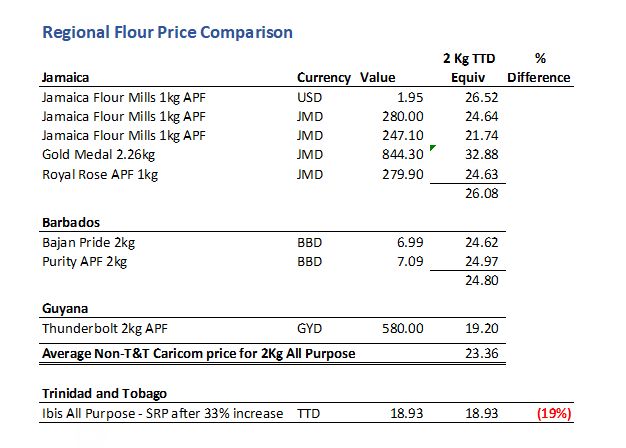(Trinidad Guardian) Consumers should be prepared to pay almost $20 or, in some cases, even more for a two-kilo bag of flour effective today, as they will have to fork out as much as 28 per cent more on the retail price of flour, the National Flour Mills Limited has announced.
While the country is already faced with exorbitant food prices and rising inflation, the NFM said yesterday that the cost of wheat has increased by a further 49 per cent in 2022 due to the ongoing war in Ukraine, leaving it with no choice but to increase its prices.
According to the NFM, a two kg bag of Ibis flour, which was $14.77, will now cost $18.93, an increase of $4.16 or 28 per cent.
This comes less than six months after NFM announced an increase in the price of its flour.
Despite this, global wheat prices fell yesterday, coinciding with forecasts of favourable harvests and production ahead in major wheat producing countries, including Russia, according to a report in Bloomberg.
In a release issued yesterday, however, NFM CEO Ian Mitchell described the global situation as “the most turbulent period for wheat supply and food security in recent history.”
The company advised that while flour is the main ingredient in a range of food items, it is “not the only one, so an average increase of 28 per cent in the retail price of flour should not necessarily translate into a 28 per cent increase in the price of everything that contains flour.”
However, when the NFM raised its prices in January this year, this resulted in a rise in related products like bread, doubles and pastries.
But the company yesterday assured that it has been able to secure sufficient wheat stocks to guarantee that Trinidad and Tobago has an adequate supply of flour for the remainder of 2022.
But it explained that its latest move was to ensure the company remains viable.
“As a result, to reduce losses in its flour division, National Flour Mills has had to increase the wholesale price of flour by 33 per cent, with a suggested increase averaging 28 per cent on the retail price of flour to the consumer,” the company said.
It added that this decision followed continued initiatives to reduce operating costs to maintain the price of flour, in the face of increased supply chain challenges and soaring commodity prices.
The company added that the emerging crisis in eastern Europe and the decision by India and at least seven of the world’s wheat suppliers to curtail exports, saw a reduction in the quantities available to non-producing nations like T&T and resulted in dramatic increases in the price of wheat globally.
The NFM further explained that this “geopolitical hurricane” has caused Spring Wheat futures to jump from as low as US$8.55 per bushel in January 2022, to as high as US$14.06 per bushel in May 2022, an increase of 64 per cent in four months. This also represents a 138 per cent increase in Spring Wheat futures from US$5.90 per bushel at the beginning of 2021, the company added.
Acknowledging that flour is an important ingredient in local diets, Mitchell said while the NFM has been able to secure wheat to ensure a reliable supply of flour, the next few wheat shipments have been purchased at “record high prices” due to the crisis in Ukraine, coupled with decisions by many exporting nations to halt the export of wheat.
Still, he said the company hopes to mitigate these effects.
“We continue to explore ways to improve the efficiency of our operations and manage those costs that we can control. While we are acutely aware of the knock-on effect that an increase in the price of flour could have in the market, we must ensure that there is product available on the supermarket shelves. We must also ensure that we can generate enough positive cash flow and operating surplus to pay for these raw materials.”





